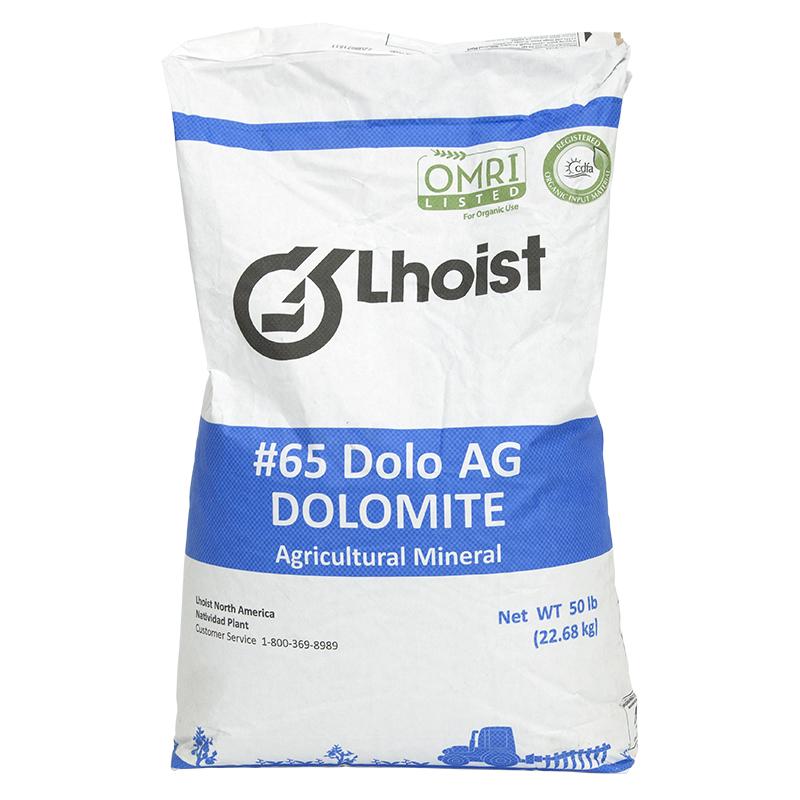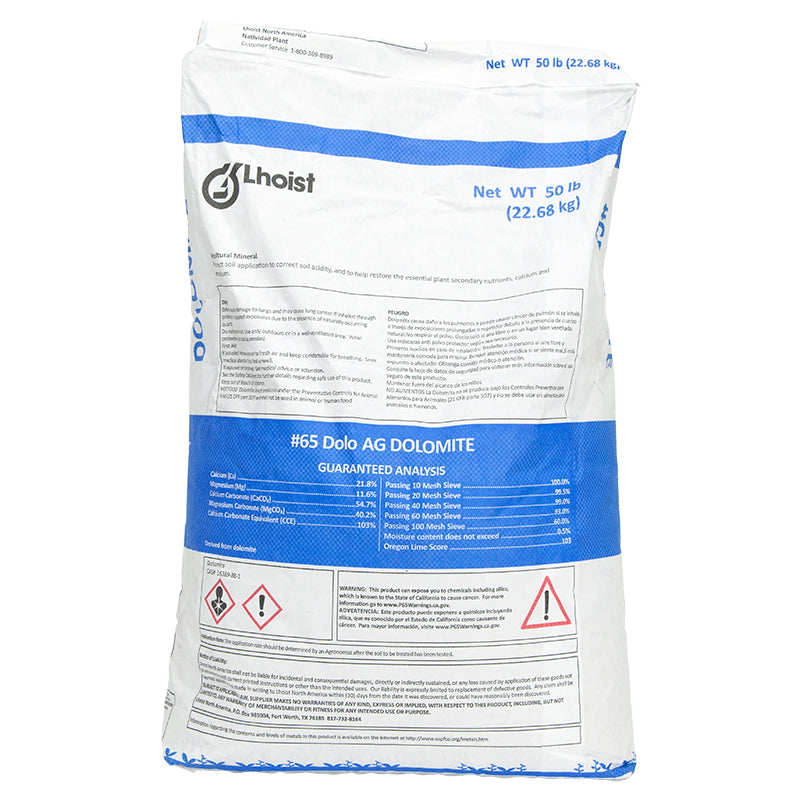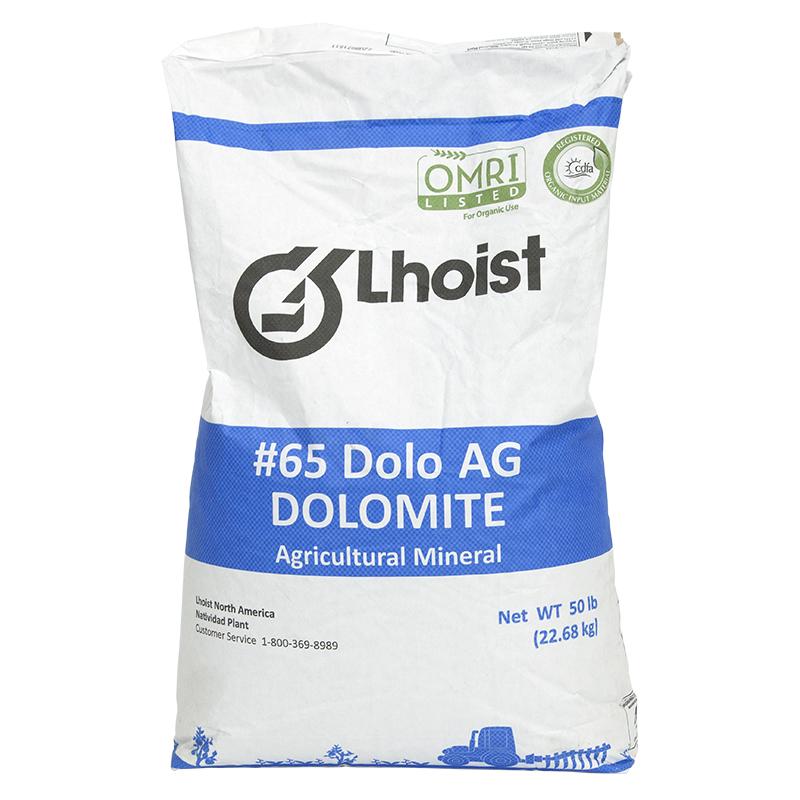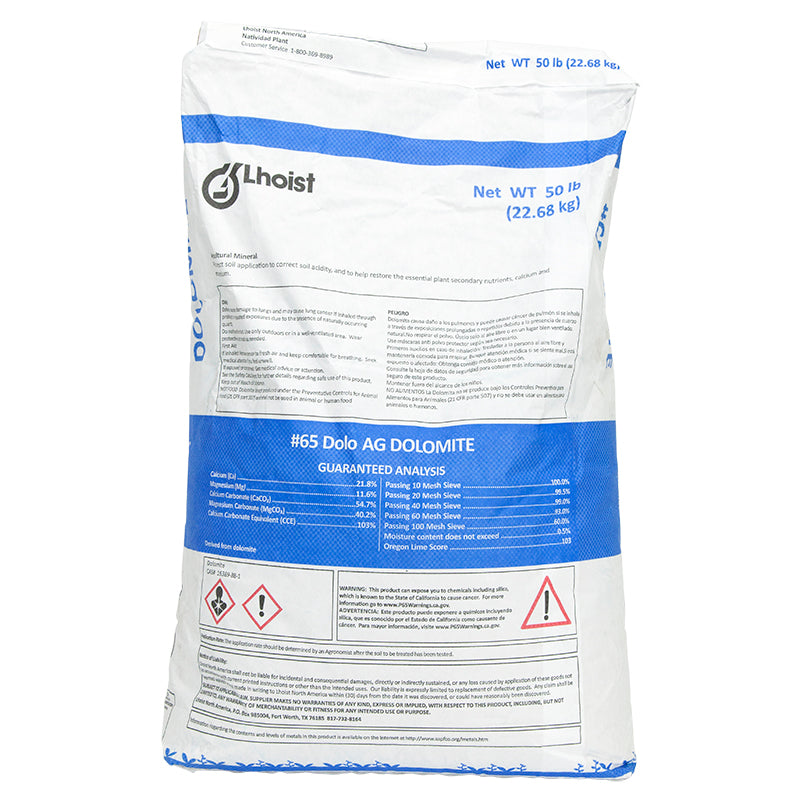Item Number: F850
Dolomite (50 lb)
Dolomite (50 lb)
Correct for Low Magnesium and Calcium
Dolomite
A mineral composed primarily of calcium magnesium carbonate (CaMg(CO3)2), is a versatile and valuable resource with diverse applications across various industries. Derived from dolomitic limestone, a sedimentary carbonate rock abundant in carbonate minerals, dolomite possesses distinct characteristics owing to its chemical composition and geological formation.
Chemical Composition and Characteristics
Calcium Magnesium Carbonate: Dolomite's composition includes calcium, magnesium, and carbonate ions, contributing to its unique properties and versatile applications.
Mohs Hardness: On the Mohs scale, dolomite typically rates between 3.5 and 4, showcasing moderate hardness compared to other minerals.
Déodat de Dolomieu: Named after the French geologist Déodat de Dolomieu, who first identified the mineral in the late 18th century.
Formation and Geological Significance
Sedimentary Origins: Dolomite formation occurs through a process involving the alteration of limestone or calcium carbonate rocks by magnesium-rich groundwater over extended periods.
Carbonate Rock: Classified as a carbonate rock, dolomite plays a significant role in the Earth's geological composition and mineralogical diversity.
Geological Deposits: Dolomite forms as a primary mineral in sedimentary environments and is often found in association with other carbonate minerals.
Applications and Utilization
Agricultural Amendment: Used as a soil conditioner and fertilizer additive, dolomite amends soil by enhancing magnesium content and adjusting pH levels for optimal plant growth.
Construction Industry: Due to its durability and resistance to weathering, dolomite serves as a crucial material in construction, used for road bases, aggregates, and concrete production.
Steel Manufacturing: In steel production, dolomite's high magnesium content serves as a flux, aiding in the removal of impurities and facilitating steel purification.
Water Treatment: Employed in water treatment processes, dolomite aids in neutralizing acidic conditions and removing contaminants from water sources.
Variants and Geological Diversity
Dolomitic Limestone: A rock predominantly composed of dolomite and calcite, utilized extensively in construction, agriculture, and manufacturing.
Dolomite Rock: A type of carbonate rock, dolomite rock stands as a significant geological resource with diverse applications.
Industrial Formulations: Dolomite exists in various forms, including powdered or granulated, adapted for specific industrial requirements.
Benefits and Considerations
Nutrient Source: Acts as a valuable source of calcium and magnesium for soil amendment, particularly in areas with mineral deficiencies.
Acidic Soil Correction: Dolomite's buffering capacity helps neutralize soil acidity, promoting healthier conditions for plant growth.
Usage Moderation: While beneficial, excessive dolomite application may lead to magnesium accumulation, potentially impacting soil pH levels and plant health.


Check Your Zone Compatibility:
Compatible with your zone.
Growing Zone for
,

Our Guarantee To You
Since 1976, we've served our customers at every stage of growing. Please contact us at any time. We are happy to support and assist you.
Description
Description
Dolomite
A mineral composed primarily of calcium magnesium carbonate (CaMg(CO3)2), is a versatile and valuable resource with diverse applications across various industries. Derived from dolomitic limestone, a sedimentary carbonate rock abundant in carbonate minerals, dolomite possesses distinct characteristics owing to its chemical composition and geological formation.
Chemical Composition and Characteristics
Calcium Magnesium Carbonate: Dolomite's composition includes calcium, magnesium, and carbonate ions, contributing to its unique properties and versatile applications.
Mohs Hardness: On the Mohs scale, dolomite typically rates between 3.5 and 4, showcasing moderate hardness compared to other minerals.
Déodat de Dolomieu: Named after the French geologist Déodat de Dolomieu, who first identified the mineral in the late 18th century.
Formation and Geological Significance
Sedimentary Origins: Dolomite formation occurs through a process involving the alteration of limestone or calcium carbonate rocks by magnesium-rich groundwater over extended periods.
Carbonate Rock: Classified as a carbonate rock, dolomite plays a significant role in the Earth's geological composition and mineralogical diversity.
Geological Deposits: Dolomite forms as a primary mineral in sedimentary environments and is often found in association with other carbonate minerals.
Applications and Utilization
Agricultural Amendment: Used as a soil conditioner and fertilizer additive, dolomite amends soil by enhancing magnesium content and adjusting pH levels for optimal plant growth.
Construction Industry: Due to its durability and resistance to weathering, dolomite serves as a crucial material in construction, used for road bases, aggregates, and concrete production.
Steel Manufacturing: In steel production, dolomite's high magnesium content serves as a flux, aiding in the removal of impurities and facilitating steel purification.
Water Treatment: Employed in water treatment processes, dolomite aids in neutralizing acidic conditions and removing contaminants from water sources.
Variants and Geological Diversity
Dolomitic Limestone: A rock predominantly composed of dolomite and calcite, utilized extensively in construction, agriculture, and manufacturing.
Dolomite Rock: A type of carbonate rock, dolomite rock stands as a significant geological resource with diverse applications.
Industrial Formulations: Dolomite exists in various forms, including powdered or granulated, adapted for specific industrial requirements.
Benefits and Considerations
Nutrient Source: Acts as a valuable source of calcium and magnesium for soil amendment, particularly in areas with mineral deficiencies.
Acidic Soil Correction: Dolomite's buffering capacity helps neutralize soil acidity, promoting healthier conditions for plant growth.
Usage Moderation: While beneficial, excessive dolomite application may lead to magnesium accumulation, potentially impacting soil pH levels and plant health.
Shipping Information
Shipping Information
Does not qualify for Flat Rate Shipping.
Shipping Weight: 51.0 lb
Dimensions: 20.0"L x 14.0"W x 4.0"H
Features
Features
Characteristics
Characteristics
Use Instructions
Use Instructions
Useful Information
Useful Information
Guarantee
Guarantee
Share






